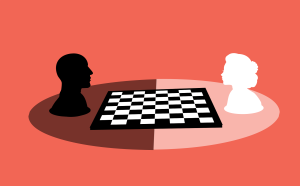

The eternal battle between ‘Man vs. Machine’ has been a favorite theme in Hollywood and science fiction, exploring the concept of using computers to replace humans in complex decision-making. This notion, often driven more by emotion than logic, finds its epitome in the world of chess—a game that epitomizes sophisticated mental prowess.
Programming computers to excel at chess has become a focal point in Artificial Intelligence. Both the human brain and computers can be viewed as finite state systems, with the brain having an immense number of states that are challenging to interpret. However, from a hardware perspective, computers can somewhat replace the human brain.
The human approach to chess heavily relies on pattern recognition, drawing from experience to formulate unique chess concepts. In contrast, computers employ a more deterministic approach, calculating each move’s options and analyzing the game to its finite conclusion. Yet, this optimistic view encounters challenges in the sheer complexity of chess possibilities.
Silicon processors face primary limitations in replicating human thought processes due to the distinct thinking modes of the brain’s two hemispheres. While digital computers can simulate the left cerebral hemisphere’s logical processes, reproducing the right hemisphere’s visual-spatial capabilities proves challenging.
To navigate the chessboard, computers rely on a Positional Evaluation Function (PEF) that assigns numerical values to various positional features. However, this numerical approach lacks the intuitive judgment that a human player brings to evaluating positions, encompassing factors such as control of the center, material, king safety, and more.
Despite the prowess of computers in arithmetic and logic, the challenge lies in defining when a line of analysis has reached a sufficient depth. Unlike human intuition, computers suffer from the horizon effect, a shortsightedness that affects their ability to foresee tactical developments beyond a certain point.
The definition of quiescence, a state where nothing tactically significant occurs, is crucial for efficient analysis. Computers grapple with finding a mechanical definition of this state, leading to challenges in maintaining a controllable yet effective Tree of Analysis.
In the realm of computer chess, sheer brute force often prevails. However, this approach, while showcasing the raw power of number crunching, falls short in contributing meaningfully to our understanding of human thought processes.
While computers may eventually surpass human players in chess, their present style of play offers insights into algorithms rather than human cognition. The ongoing clash between man and machine in chess strategy unfolds as a fascinating journey, promising to reshape our understanding of both artificial intelligence and the intricacies of human thought.
– Written by Dr. Sanjay Saxena





Enter your email address to register for our newsletter subscription.
107 High Mount, Station Road, London NW4 3ST, United Kingdom
76 Ramky Pearl, Kukatpally, Hyderabad 500072, India
©2025 ScaledIQ Consulting Limited. All Rights Reserved.